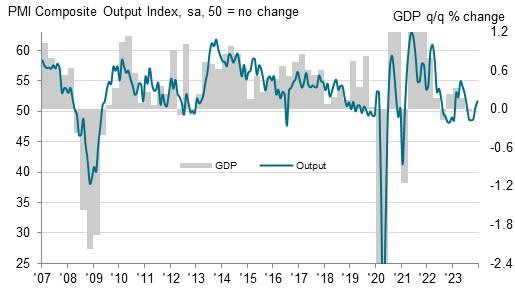UK PMI Manufacturing fell from 47.2 to 46.4, below the expected 47.5. Conversely, PMI Services rose from 50.9 to 52.7, exceeding expectations of 51.0 and reaching a six-month high. This surge in services also lifted PMI Composite from 50.7 to 51.7, marking another six-month high.
Chris Williamson, Chief Business Economist at S&P Global Market Intelligence, commented, “The UK economy continues to dodge recession, with growth picking up some momentum at the end of the year to suggest that GDP stagnated over the fourth quarter as a whole.” He added that while employment fell for a fourth consecutive month, the decline was marginal and did not significantly impact unemployment.
Williamson also highlighted the dual-speed nature of the UK economy, with manufacturing contracting sharply while services, particularly financial services, showed signs of growth. This growth in services was partly attributed to expectations of lower interest rates in 2024.
The divergence between the two sectors is also evident in inflation pressures. While goods-producing sector showed falling prices, service providers reported persistent and elevated inflationary pressures, often linked to wage growth. Williamson indicated that this could keep inflation above 3% in the coming months.
He added, “The service sector’s resilience and sticky inflation picture will add to speculation that it’s too early for the Bank of England to be talking about cutting interest rates.” However, he also cautioned that the tentative nature of December’s growth and the impact of looser financial conditions could raise fears of further policy tightening, potentially leading to economic decline.

